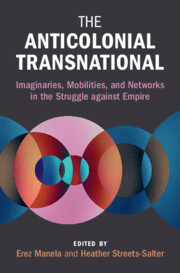Book contents
- The Anticolonial Transnational
- Global and International History
- The Anticolonial Transnational
- Copyright page
- Contents
- Figures
- Contributors
- Acknowledgments
- 1 Introduction
- Part I The Many Anticolonial Transnationals
- Part II Solidarities and Their Discontents
- Part III Anticolonialism in a Postcolonial Age
- 10 The Unexpected Anticolonialist: Winifred Armstrong, American Empire, and African Decolonization
- 11 Beyond the NIEO: Self-Reliance as an Alternative Vision of Postcolonial Development
- 12 Guam’s Quest for Indigenous Chamorro Self-Determination in the Age of Pacific Anticolonialism
- 13 Reggae, Sound Systems, and Arrested Decolonization in Bermuda
- 14 Epilogue: The National and the Colonial in the Anticolonial Transnational
- Index
13 - Reggae, Sound Systems, and Arrested Decolonization in Bermuda
from Part III - Anticolonialism in a Postcolonial Age
Published online by Cambridge University Press: 10 August 2023
- The Anticolonial Transnational
- Global and International History
- The Anticolonial Transnational
- Copyright page
- Contents
- Figures
- Contributors
- Acknowledgments
- 1 Introduction
- Part I The Many Anticolonial Transnationals
- Part II Solidarities and Their Discontents
- Part III Anticolonialism in a Postcolonial Age
- 10 The Unexpected Anticolonialist: Winifred Armstrong, American Empire, and African Decolonization
- 11 Beyond the NIEO: Self-Reliance as an Alternative Vision of Postcolonial Development
- 12 Guam’s Quest for Indigenous Chamorro Self-Determination in the Age of Pacific Anticolonialism
- 13 Reggae, Sound Systems, and Arrested Decolonization in Bermuda
- 14 Epilogue: The National and the Colonial in the Anticolonial Transnational
- Index
Summary
This chapter explores how Black youth in the British colony of Bermuda engaged decolonization, Black Power, and Black internationalism through Reggae, Dancehall, and sound system culture in the “global 1990s.” Centered on a racially charged 1995 referendum on independence in which, out of 58.8 percent of eligible voters, 73.6 percent voted against and 25.7 percent voted for independence, it argues that it is critical to explore Black anticolonialism through soundscapes and not just ballot politics, as Black Bermuda is a sonic culture. The era’s Reggae sound system clashes often invoked long-standing racial and colonial tensions, such as one between Bermuda’s Souljah One and British DJ David Rodigan. Through archives drawn from print media, government surveillance, and audio recordings, it shows that while sound system culture could not “free decolonization,” it played a crucial role in galvanizing the Black and working-class Progressive Labor Party’s youth base in its first political victory in 1998.
Keywords
- Type
- Chapter
- Information
- The Anticolonial TransnationalImaginaries, Mobilities, and Networks in the Struggle against Empire, pp. 265 - 291Publisher: Cambridge University PressPrint publication year: 2023

